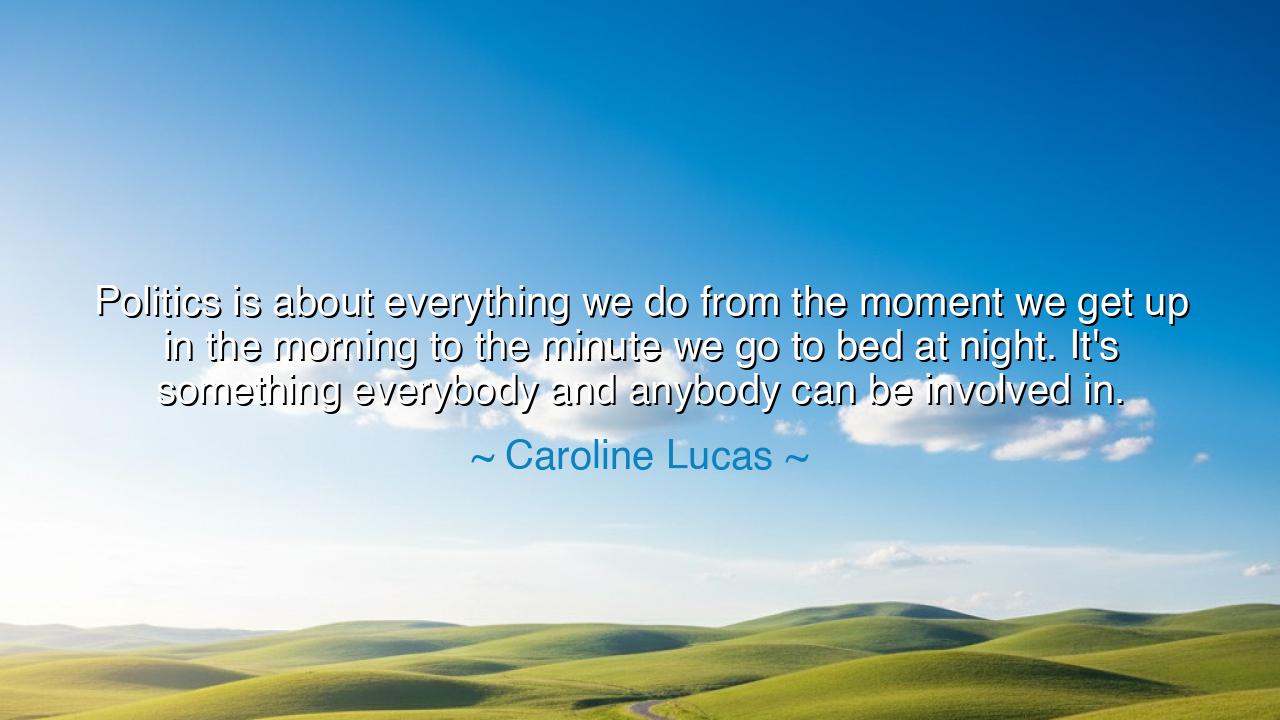
Politics is about everything we do from the moment we get up in
Politics is about everything we do from the moment we get up in the morning to the minute we go to bed at night. It's something everybody and anybody can be involved in.






Hear the words of Caroline Lucas, a voice of conviction, who declared: “Politics is about everything we do from the moment we get up in the morning to the minute we go to bed at night. It’s something everybody and anybody can be involved in.” In this saying, she strips away the veil of formality and reveals politics not as the distant realm of kings, parliaments, or presidents, but as the very fabric of life itself. She reminds us that politics is not reserved for the powerful, but is woven into each choice we make, each act we take, each word we speak.
For what is politics, if not the ordering of our common life? When we rise in the morning, the food we eat, the water we drink, the streets we walk upon, the work we labor at—all these are shaped by the decisions of people and the structures of society. When we lie down at night, the safety of our home, the justice of our community, the peace of our conscience—these too are political fruits. To live is to be political, for no life is lived in isolation.
The ancients knew this truth well. Aristotle called man a “political animal,” bound by nature to live within the polis, the city. He taught that virtue itself could not flourish apart from the laws and customs that shaped the citizen’s life. Even the humble farmer or potter was part of the great body of the state. In Lucas’s words, we hear the echo of this ancient wisdom: politics is not a lofty debate above our heads—it is the ground we walk upon every day.
History too gives its witness. Consider Rosa Parks, a seamstress in Montgomery, Alabama. She was not a queen nor a senator, but one day, weary from injustice, she chose not to surrender her seat on a bus. That single act, small in the moment, resounded like thunder across a nation. From her daily life, politics was born anew, and the civil rights movement surged forward. Her story proves Lucas’s truth: “anybody” can be involved, for every life holds the power to change the course of history.
And yet, O listener, Lucas’s words also bear responsibility. If politics belongs to all, then none may wash their hands of it. To claim disinterest is itself a political act, for it gives power to those who would rule without question. The tyrants of history have always thrived on the silence of the many. But when the people see that every act, from their labor to their rest, is touched by politics, then they rise with courage to shape the world rather than be shaped by it.
The lesson is clear: do not wait for summons to some distant hall of power. Recognize the politics in your everyday choices—in the food you buy, the voices you support, the way you treat your neighbor. Each act, however small, adds its stone to the building of society. If you desire justice, let it be in your daily life; if you long for peace, let it dwell in your speech and deeds. This is the politics that Lucas calls us to: not only of parties and parliaments, but of kitchens and classrooms, of markets and streets.
Therefore, rise each morning with the knowledge that you already walk in politics. Do not despise small actions, for they accumulate into great tides. Speak truth, act with kindness, resist injustice wherever you see it, and let your daily steps be the work of building a better polis. For in the end, the power of politics lies not only in rulers, but in the unyielding choices of countless souls.
So remember Caroline Lucas’s wisdom: politics is not distant, but daily. It is not for the few, but for all. Live your life as if each hour were part of the great work of shaping the world—for indeed, it is. And when you lie down at night, may you rest knowing that your day has been part of the eternal labor of justice and hope.






AAdministratorAdministrator
Welcome, honored guests. Please leave a comment, we will respond soon